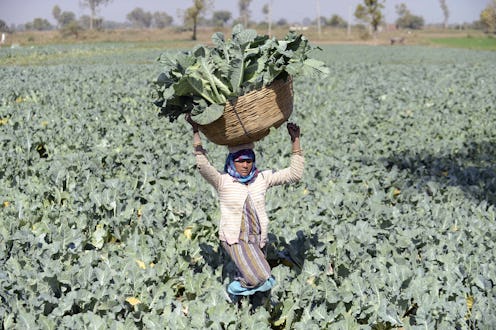Life
By 2050, Climate Change Will Kill This Many People
A study published in The Lancet yesterday investigates how shifts in food production caused by climate change will affect human health in the future, and the results are sobering: The researchers report that climate change could cause more than 500,000 deaths in 2050. The study, led by Dr. Marco Springmann from the Oxford Martin Programme on the Future of Food at the University of Oxford, focuses particularly on how climate change will affect what we eat, and predicts that it will reduce people’s consumption of vegetables, fruit, and red meat. Climate change may also cut improvement in food availability by a third by the time we reach the mid-century. These shifts in diet, in turn, could have a major impact on people’s bodyweight and other health factors, and cause an increase in serious conditions like cancer, heart disease, and stroke.
The researchers found that, without intervention to reduce climate change, people in 2050 will face an average decrease in food availability of 3.2 percent. Their consumption of fruits and vegetables will decrease by 4 percent, and of red meat by 0.7 percent. These numbers may not seem huge on their face, but these reductions will have a serious effect on health and bodyweight. “Our results show that even modest reductions in the availability of food per person could lead to changes in the energy content and composition of diets, and these changes will have major consequences for health," Dr. Springmann said in Science Daily.
Although these changes in food availability will affect health all over the world, the researchers' analysis of 155 countries found that some will be more severely impacted than others. South and East Asia will bear the worst of it, with China facing an extra 230.64 deaths per million people in 2050 (for a total of almost a quarter of a million people), and India facing an additional 105 deaths per million (adding up to 136 thousand). Other countries in Asia, including Vietnam and the Republic of Korea, as well as European countries like Greece and Italy will also be hard hit. The United States will bear twenty-eight additional deaths per million due to dietary shifts caused by climate change.
This future isn’t set in stone, but change needs to happen now to prevent it. Springmann and his colleagues modeled how the impact of climate change on food production will affect health in four different potential futures, ranging from low emission to high emission cases. They found that cutting emissions now could have a significant, positive effect on health down the road. Even switching from a high-emission scenario to a medium-emission scenario would decrease deaths related to climate change by almost a third (30 percent). “Climate change is likely to have a substantial negative impact on future mortality, even under optimistic scenarios,” Springmann said. “Adaptation efforts need to be scaled up rapidly. Public-health programmes aimed at preventing and treating diet and weight-related risk factors, such as increasing fruit and vegetable intake, must be strengthened as a matter of priority to help mitigate climate-related health effects.”
